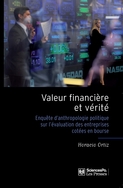The second installment of the special issue on the sociology of financial agency for Sociétés Contemporaines is now out. It includes a key PERFORMABUSINESS contribution by Liliana Doganova, titled “Décompter le futur: la formule des flux actualisés et le manager-investisseur”. From the abstract:
The discounted cash flow formula (DCF) is one of the investor’s key tools. It derives the value of a good from the cash flows that this good will produce in the future, reducing them by a factor that is all the higher as they are distant in time. This paper examines the foundations of the DCF formula and identifies three different configurations – ensembles of problems, actors and objects – in its development. A solution to the practical problem of valuing and managing forests in the calculations of German foresters in the middle of the 19th century, then the expression of a universal definition of value in economic theory in the beginning of the 20th century, the formula has become, since the 1950s, an instrument for governing investment and has spread in firms’ practices. The paper sheds light on the role played by the state, economists and consultants in the constitution of this formula as the main tool for assessing investments. It describes the effects that the DCF formula induces on the objects to which it comes to be applied, and the figure of the user – an “investing manager” – that it sketches and equips.

